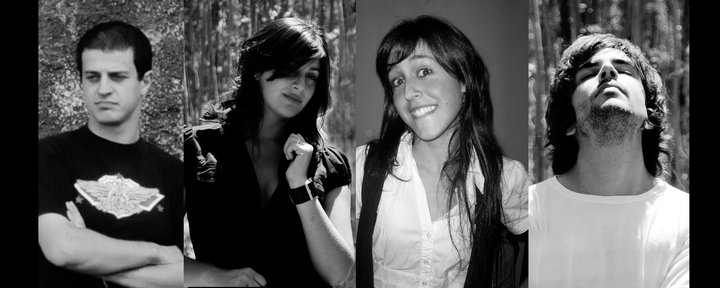
El Cardenal Sebastián Are Carolina Falcon (Vocals) Diego Centurion (Guitar & Backing Vocals), Nadia Costa (Guitar & Backing Vocals) and Juan Pablo Pola (Bass, Keyboards & SFX).
I have in front of me the liner notes that Bill Flanagan penned for Jeff Buckley’s posthumous release, “(Sketches For) My Sweetheart The Drunk”. There, at the end of the first paragraph (the one that invariably holds the deepest poignancy as it has to introduce the subject, and at the same time summarize its blazing successes without overemphasizing the tragedy that truncated his life) I find the one remark that lets me describe this independent Uruguayan band after having lived with its music for the last two weeks.
When explaining Buckley’s reluctance to issue the disc he had recorded with the mythical Tom Verlaine some time before his untimely passing, Flanagan justifies the decision by describing Jeff’s approach to his music (and to his own life) as a process where the actual journey was emphasized over the act of arriving.
That is exactly the impression I have after listening to the music put forth by this band from Canelones. I don’t necessarily think that the songs they have recorded for their first album (named “De La Locura”; it is produced and sold by the band) can be termed a point of arrival in any sense. The music (thankfully) sounds more like a start to me, and that is always commendable when it boils to the first material that any band is releasing. If anything, El Cardenal Sebastián’s music is like a deliberately leveled journey towards an horizon that doesn’t seem that far out of reach. Yet, the horizon that is aimed for is actually an undulating one which makes it hard to discern where it is that the ground ends and the sky commences. The purpose of the actual journey turns into a much trickier one. What lies on one side and what lies on the other? That is the basic question that the band poses. Both the music and the lyrics transmit that sense of a procession towards something which is fated to be in two places at the same time, for the simple reason that, well, such is life. And whatever shortcomings their music might have, you can’t veto it on grounds of failing to express vitality.
In “Detras De Su Piel” [Behind His Skin], singer Carolina Falcón announces “Voy cruzando la ciudad que se enciende” [I go through the city as it lights up], and later in the same song the search for “las semillas de lo incierto” [the seeds of uncertainty] is presented as the one and only valid pursuit. Yet, the song poses the insoluble dilemma of having to root yourself in order to let life germinate and spread from what was once you. That dilemma (the conflict between what one is and one wants to become, that duality again) is precisely what lies at the heart of the song, and of the repertory that the band has unleashed so far.
Another song (De La Locura) includes the lines “Una vez hice el intento de escribirle al sol/quizá bajo los efectos de una pasajera ilusión” [I once tried to write to the sun/maybe under the influence of a fleeting illusion]. And this explicit study of a link between the real world and an illusory state is further developed later on, in the lyrics “Yo viajé por un momento en otra realidad/fue como sentir tus dedos/besando mi tranquilidad” [I traveled for a little while through another reality/it was like feeling your fingers/kissing my tranquility].
I have to admit that sometimes they lose me along the way, such as in the song “Solo” [Alone], which is far too typical and topical in its treatment of romantic disillusionment.
Commenting on the actual production values of these songs would be gratuitous, as they are self-funded recordings. But if you were to charge that the snare drum lacks depth and that the sound effects in songs like “Para No Ceder” come across as cheesy you would also have to mention that the vocals are pristine in the way that they coalesce and bounce off each other when needed.
The Italian often say that it is always much better to go than to arrive. That is true, but the Japanese nail it even better when they propound that “It’s preferable to travel full of longing than to arrive at your destination”. In a scene as demanding on artists like the one we have in Uruguay, having the determination to start a journey like this one implies many things. Longing is one. But so are belief, and the strength to lift your voice and ask, ask, ask for all the people that will listen to you where things that are and things that should be start and end. And start again. And any artist who is willing to find that out for us has to start by making the admission the band does on “Para No Ceder”: “Yo no sé la solución/ solo tengo esta canción/ y eso solo es todo lo que soy” [I don’t have the answer/I just have this song/and that is all I am]. That is the beginning of everything. And that is also an answer. In a disc that makes you think so much about what is what, having such an affirmation is enough to level that swaying horizon and make everything approachable for everybody. Ultimately, if there is a definitive answer to any of these questions, we are finding it together. The band provides many questions and just a little answer in their first work. But the words of Pete Townshend have never been truer. Just a little is enough.
Check El Cardenal Sebastián’s MySpace profile here. And this is their YouTube channel.

Pingback: Month In Review – August 2010 | MusicKO